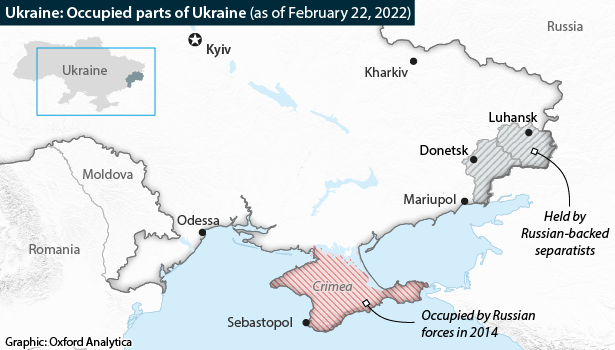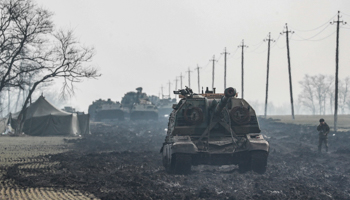Full invasion may follow Russian moves on east Ukraine
President Putin has ordered troops into eastern Ukraine after recognising two separatist entities as independent states
Russian President Vladimir Putin yesterday signed decrees recognising the two separatist entities in eastern Ukraine as independent states, signed mutual assistance treaties with them and ordered troops to move in there. Rhetoric and preparations preceding Putin's decision suggest it has been planned for some time and that his talk of pursuing negotiations on the Minsk 2.0 peace agreement was a smokescreen. US sanctions announced yesterday are limited, covering only direct engagement with the two entities.
What next
Since this move was prepared well in advance, Putin will probably order an invasion, regardless of Western diplomacy and threats of hefty sanctions. One speaker at yesterday's Security Council meeting suggested capturing the port of Mariupol as a "historical" part of the occupied territories. Recognition leaves options open: it would make sense to consolidate the two entities into one; annexation by Russia is possible, as in Crimea this step was preceded by recognition in 2014.
Subsidiary Impacts
- The EU is discussing broader sanctions than the United States has applied; both will evolve quickly.
- Germany has sent a strong signal by halting certification of the Nord Stream 2 pipeline.
- Russians may support their 'compatriots' in eastern Ukraine but resent the diversion of funds to bail them out.
Analysis
Putin addressed the nation after a televised gathering of the Security Council at which his top officials gave their assent to recognition. This followed weeks of anti-Kyiv rhetoric, claims of an impending Ukrainian offensive and the wholesale evacuation of civilians from the Donetsk People's Republic (DNR) and Luhansk People's Republic (LNR).
He began by setting out his version of history, according to which the people in eastern Ukraine have always been Russian. He covered hundred of years into the 20th century before excoriating post-1991 Ukraine. He accused Kyiv of planning to acquire nuclear weapons and condemned NATO for supplying weapons to the country and trying to turn it into a "potential theatre for military operations".
After outlining what he saw as NATO's various misdeeds, he returned to the DNR-LNR question, saying the Kyiv authorities were intent on a military solution. Therefore, he said, he felt it essential to take the long-overdue decision on "immediate recognition of the independence and sovereignty" of the DNR and LNR.
He signed decrees on recognition and treaties on friendship, cooperation and mutual assistance with both entities; the treaties were immediately signed by DNR leader Denis Pushilin and LNR head Leonid Pasechnik.
Putin's decision was swift and unexpected
Pushilin was installed in September 2018 and Pasechnik in September 2017, both as a result of internal coups seen as ways for Moscow to regain influence over unruly local elites prone to factional conflict. The two men have since exerted more stable control and obeyed Moscow's instructions (see UKRAINE: Moscow will direct change in rebel region - September 7, 2018 and see UKRAINE: Rebel strife will not impact war dynamics - December 13, 2017).
Troops roll in
In the early hours of this morning, Putin instructed the Russian army to enter the DNR and LNR. Officially this is to "maintain peace" until the friendship and cooperation treaties are in place. Both chambers of Russia's parliament ratifiedthe documents today. There is no suggestion the troops will leave.
Some reports call them 'peacekeeping troops'. Russia possesses peacekeeping forces -- some are deployed around Nagorno-Karabakh -- but in all likelihood the deployment involves the 8th Combined Arms Army, sitting immediately across the border in Rostov region.
Measured US response
US President Joe Biden responded by applying sanctions, limited to barring US nationals from investing in, importing from or financing either region, and freezing any US assets of top DNR and LNR leaders. The White House said these actions deliberately targeted the two regions only and were separate from "swift and severe economic measures we have been preparing in coordination with allies and partners" in the event that Russia "further" invades Ukraine.
The term "further" has been used before and allows more than one interpretation: it could encompass the well-known covert Russian actions in eastern Ukraine in addition to the seizure of Crimea in 2014. In any case, it implies a distinction between "lesser" and "greater" forms of invasion, incurring different levels of penalties.
Putin will have factored these gradations and grey areas into his calculations. Occupying eastern Ukraine presents him with an easy victory: yesterday's US sanctions mean little.
Invasion risk
The planning and preparation that went into yesterday's decision suggests that Putin intends to invade Ukraine. If so, he will not be deterred. He will have factored in or dismissed the threat of sanctions and the prospect of large casualties (see RUSSIA: Putin weighs options against costs and gains - February 16, 2022 and see RUSSIA/UKRAINE: Evidence tilts towards war likelihood - February 14, 2022).
Putin will have factored in the risks of occupation and wider invasion
This assessment is based on the available evidence:
- There has been no sudden change in Ukraine to prompt recognition and occupation. Kyiv was not planning to attack the DNR and LNR, as Moscow asserts.
- Twin sets of negotiations, on Minsk 2.0 and on Moscow's demands of Washington and NATO, were proceeding on schedule with no major upsets apart from Russia's general dissatisfaction (see UKRAINE: Peace talks are meant to help de-escalation - February 18, 2022).
- Russia has not withdrawn more than a nominal portion of the ground, air, missile and naval forces arrayed in combat-ready formation around Ukraine. Troops deployed for war games in Belarus will not now leave, as had always been promised.
Moscow has always publicly espoused the position that it follows international law punctiliously. Western states regard its actions as aggressive and lawless, but Moscow has always found a justification, in its own terms, for acts such as invading Georgia in 2008 and annexing Crimea in 2014.
Putin has shifted from his previous, repeated insistence that there is no alternative to Minsk 2.0 and that the DNR and LNR would eventually return to Ukraine. Now he has discarded the principles underlying Minsk 2.0.
That points to a broader shift away from claims of legality to pursuing his objectives at any cost. It removes any notional obstacle to invading Ukraine and at least attempting to occupy and govern it. The only possible barrier -- NATO intervention -- is out of the question.
DNR-LNR future status
The DNR and LNR do not look viable as independent states. After Russia recognised Abkhazia and South Ossetia in 2008, only a handful of friendly states including Syria, Venezuela and Nicaragua followed suit. Tuvalu withdrew its recognition in 2014 and Vanuatu's position is confused.
Abkhazia, for example, has the advantage of a distinct culture and language on which to build identity. The DNR and LNR do not; their main expression of national identity is with Russia -- half a million residents have accepted Russian passports.
One early option would to consolidate the two entities into one. That would face resistance from local leaders, but Moscow would simply coerce or replace them.
A subsequent option is for Russia to annex the two regions (or a unified one). Formal annexation of Crimea followed initial recognition of statehood and a rigged referendum.
In any eventuality -- one or two statelets or a new Russian region -- and whether or not a larger invasion proceeds, Moscow will consider military action to expand Donetsk-Luhansk territory. Interior Minister Vladimir Kolokoltsev suggested as much at yesterday's Security Council meeting, proposing that the key port of Mariupol and other areas be covered by the recognition ruling -- implying a major military attack.
Deputy Foreign Minister Andrey Rudenko said today that recognition covered only territory now governed by DNR and LNR structures. Since Moscow is no longer observing the rules of negotiation and its version of international law, Rudenko's assurance means nothing.

